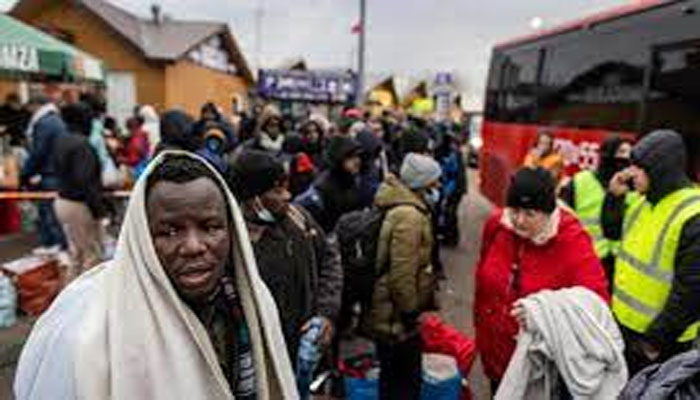
Afrasianet - A report by the "New York Times" revealed that many Africans were subjected to racist and harsh treatment at the Ukrainian borders neighboring European Union countries while fleeing the country. In a report, "The New York Times" quoted a number of Africans who were living in Ukraine, saying, "They were stuck for several days at the crossings to the neighboring European Union countries, huddled in the cold without food or shelter, and were detained by the Ukrainian authorities, who pushed them to the ends of queues."
for a long time and even hit them, while allowing the Ukrainians to pass." In a phone interview with a “trembling voice,” Cheney Mbagu, a 24-year-old Nigerian doctor who lives in the western Ukrainian town of Ivano-Frankivsk, told the newspaper that she had “spent more than two days stuck at the border crossing between Poland and Ukraine in the town of Medica, while allowing The guards crossed the foreign Ukrainians, but they prevented it.
"Ukrainian border guards wouldn't let us cross...they were beating people with sticks, taking off their jackets, slapping them, hitting them and pushing them to the end of the queue, the scene was horrific," she added. For his part, the African Union and Nigerian President Muhammadu Buhari condemned the treatment of Africans fleeing Ukraine after reports on social media that border guards prevented them from leaving, and that they were prevented from boarding trains heading to the border.
The union noted that "reports that Africans are being targeted with unacceptable different treatment would be appallingly racist" and violate international law, while Ukraine's deputy interior minister, Anton Herashchenko, denied that his country was preventing foreigners from leaving.
According to the "New York Times", the Nigerian doctor Mbagu was able to reach Warsaw, but she said that she "crossed the border only through suffering and going on her way," adding: "They were saying .. only women and children can pass, but they let some Ukrainian men pass, And whenever a black woman tried to pass, they said...our women first...there was no shelter from the cold...snow..there was no food, water, or a place to rest...I was literally delirious from sleep deprivation."
The newspaper quoted the doctor as saying that "her 21-year-old brother, a medical student, has been prevented from crossing the border since Friday, but arrived in Poland after four days of trying."
Some of the foreigners who arrived in Poland from Ukraine over the past few days have fallen ill and froze, according to local aid organizations on the ground, and some have been taken directly to hospitals with their injuries. Ahmed Al-Haboubi, a 22-year-old French-Tunisian medical student, revealed to the New York Times that "all foreign nationals, including Africans, were asked to go to one gate at the Medica crossing from Ukraine to Poland, which will deal with Only four, one every two hours, while Ukrainians were allowed to pass freely through another gate."
He added in a phone interview: "The Ukrainian army hit me so hard that I couldn't walk properly.. When I finally managed to enter Poland, the Polish authorities took me straight to the hospital.. It was utter chaos. We were treated like animals, and there are still thousands of people out there. Stranded there," he said, adding that Poland "received him warmly."
Denis Nana Appiah Nkansah, a Ghanaian medical student, confirmed to the newspaper that he "saw the same discrimination when crossing from Ukraine into the Romanian town of Siret - a base for Ukrainians and another for everyone else," noting that "thousands of foreigners, including Zambians, Namibians, Moroccans and Indians, were directed to And Pakistanis, to one of the gates that was mostly closed, while another gate for Ukrainians was open and people streamed through.”
"Over the course of about three hours, four or five foreigners were allowed to leave, while there was a 'massive influx' of Ukrainians who crossed the border," he said, adding: "It's not fair, but we understood that they had to see their people first."
Nkansah, 31, said that he organized a group of 74 students from Ghana and Nigeria to participate and rent a bus to flee together, and that they arrived at the border early Saturday morning, but it took 24 hours to cross them. The newspaper quoted Emmanuel Nolo, 30, a Nigerian electronics student at Kharkov National University, as saying that "when he tried to board a train in Ukraine heading west towards the border, Ukrainian officials told him, "Blacks can't board the train," explaining that he and his cousin managed Who forced their way.
The newspaper pointed out that "Taha Daraa, a 25-year-old Moroccan student in his fourth year studying dentistry at the Dnipro Medical Institute, began his journey around noon Saturday and crossed the border to Romania in the early hours of Monday morning after days of no sleep."
He explained, "We were treated badly.. We took buses to the Romanian border.. It was very scary. Then we had to walk across the border while we heard gunshots..All we did was pray. Our parents also prayed for our safety..It's protection."
The only one we enjoy.. I saw a lot of racism,” he said, noting that “he was in a group with other Moroccans and many other Africans and asked one of the Ukrainian border guards to let them pass.
The guard started shooting his rifle in the air to scare them, so they retreated.” And Taha Daraa continued, "I've never felt this much fear in my life.. He asked us to go back.. It was snowing on us, and as the crowd grew, they surrendered and allowed everyone to pass."

